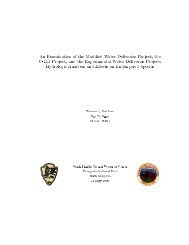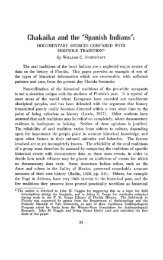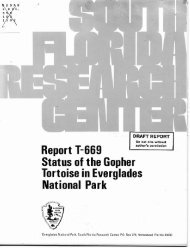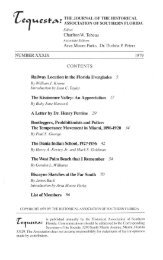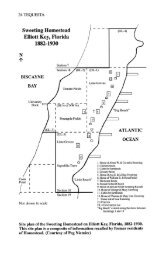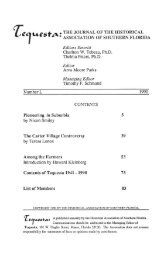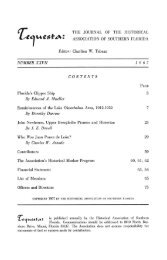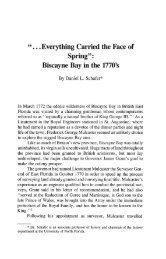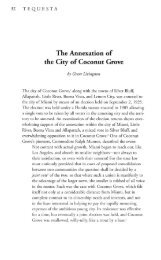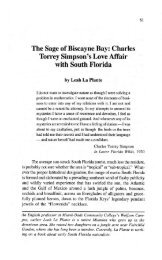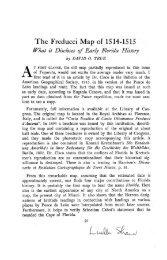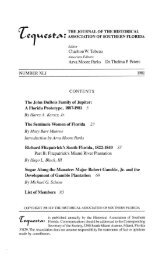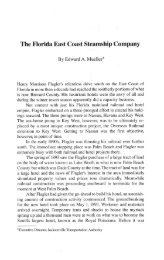Miami During the Civil War - FIU Digital Collections
Miami During the Civil War - FIU Digital Collections
Miami During the Civil War - FIU Digital Collections
You also want an ePaper? Increase the reach of your titles
YUMPU automatically turns print PDFs into web optimized ePapers that Google loves.
<strong>Miami</strong> <strong>During</strong> <strong>the</strong> <strong>Civil</strong> <strong>War</strong> 53<br />
avoid being seen by <strong>the</strong> Yankee soldier. After this incident, <strong>the</strong> individual<br />
continued to stay with <strong>the</strong> Wagners but kept in <strong>the</strong> house when<br />
Union men dropped by, thinking it was safer indoors. This was not<br />
an uncommon event. Every few days <strong>the</strong> word would come that<br />
Yankees were around and people would suddenly remember that <strong>the</strong>y<br />
had business somewhere else. Rose Wagner said, "You could see<br />
<strong>the</strong>m going past apparently in a great hurry, and as if time were<br />
passing." Wagner did his best to help everyone. With his benevolent<br />
neutrality he avoided confrontation and protected his family. 73<br />
Yet it was a somewhat dangerous existence. One day when<br />
Wagner was away in Key West, a drunk sergeant stopped by his<br />
home and almost caused a tragedy. The sergeant's commanding officer<br />
took his stripes for <strong>the</strong> incident. On two separate days, two men<br />
who were ei<strong>the</strong>r deserters or soldiers in trouble, came to <strong>the</strong> Wagner<br />
home. O<strong>the</strong>r soldiers later took both of <strong>the</strong>m away, but no one was<br />
harmed.<br />
A refugee named Green brought in a drove of cattle. To <strong>the</strong><br />
Union forces, such enterprises were illegal because cattle from mainland<br />
Florida were products of a rebel state. On this occasion, <strong>the</strong><br />
commanding officer of <strong>the</strong> cross-tie ship was on shore when Green's<br />
cattle were driven in. He gave orders to <strong>the</strong> soldiers with him to shoot<br />
all <strong>the</strong> cattle and give <strong>the</strong> meat to anyone who wanted it. The inhabitants<br />
ensured that none was wasted. 74<br />
The war was ending up north. Lee surrendered to Grant on<br />
April 9, 1865. One day <strong>the</strong>re were Yankee soldiers everywhere. The<br />
rumor was that <strong>the</strong> war was over and <strong>the</strong> troops were looking for<br />
Jefferson Davis. 75 The Navy guarded every entrance to <strong>the</strong> bay. Three<br />
Union steamers and several smaller craft patrolled in all directions<br />
day and night. The Confederate president never arrived, but John C.<br />
Breckinridge, Confederate secretary of war, did stop at <strong>Miami</strong> on his<br />
way to Cuba. The date was June 6, 1865. Confederate naval officer<br />
and blockade runner, John Taylor Wood, a member of <strong>the</strong> refugee<br />
party, recorded his impression of <strong>the</strong> area:<br />
As we neared <strong>the</strong> small wharf we found waiting some twenty<br />
or thirty men, of all colors, from <strong>the</strong> pale yankee to <strong>the</strong> ebony<br />
Congo, all armed; a more motley and villainous-looking crew<br />
never trod <strong>the</strong> deck of Captain Kidd's ships. We saw at once<br />
with whom we had to deal-deserters from <strong>the</strong> army and navy<br />
of both sides, with a mixture of Spaniards and Cubans, out-



